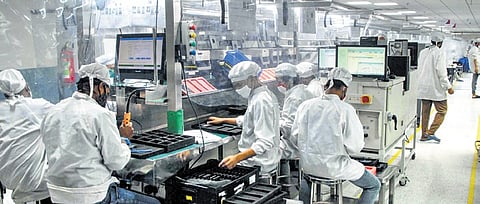

CHENNAI: Chief Minister M K Stalin on Wednesday launched the Tamil Nadu Electronics Components Manufacturing Scheme (ECMS) with a target to attract Rs 30,000 crore investment and create 60,000 jobs over the next three to five years across the state.
The announcement comes three days after the union government unveiled a set of guidelines and portal for the ECMS announced by it recently. Under the central scheme, which has a budgetary outlay of Rs 22,919 crore over six years, the union government offers hybrid incentives to companies to promote employment generation and economic growth.
The Tamil Nadu scheme, a first in the country, announced on Wednesday would offer matching subsidies to companies that set up manufacturing units in the state under the central scheme, and has been designed to boost TN’s competitiveness in attracting domestic and global investments, sources said.
The state scheme covers 11 high-growth components, including flexible printed circuit boards (FPCBs), lithium-ion cells, HDI/MSAP boards, display modules and passive components. Officials said the diversification is intended to tap into emerging markets while strengthening the local electronics manufacturing ecosystem.
“Tamil Nadu is putting skin in the game,” said Industries Minister T R B Rajaa. “This sends a strong message that the state is serious about leading India’s electronics push. The scheme will generate high-value jobs and deepen local capabilities,” he said. “We are targeting $100 billion in electronics exports,” Rajaa said.
TN electronic components scheme has 6 key segments
State officials told TNIE that any investor qualifying for central Production-Linked Incentive schemes will receive matching support from the state. The centre’s scheme offers three options: a turnover-linked grant on incremental sales, a capex-linked incentive based on verified capital expenditure and commercial production, and a hybrid of the two. TN’s matching model is expected to make the state a more attractive destination for high-value manufacturing.
Six key segments will receive targeted support — including camera and display modules, non-SMD passive components, and multi-layer PCBs. Investment threshold begins at Rs 50 crore for basic components and can go up to Rs 250 crore for sub-assemblies.
High-end PCBs are eligible for up to 10% incentive in the first year, tapering over six years. A separate 25% incentive applies to capital goods and their sub-components, subject to a Rs 10 crore minimum investment.
While no value-addition targets have been mandated, the scheme signals a shift beyond final assembly towards more integrated manufacturing. The state will earmark land near upcoming industrial hubs to encourage the development of a self-sustaining supplier ecosystem. Officials said outreach to global component makers is under way.
Tamil Nadu is the first Indian state to surpass $14.65 bn in electronics exports.